 |
 |
|
 |
|
 |
| |
|
 |
Photo
Gallery |
|
|
 |
|
|
 Maharashtra
Tour Maharashtra
Tour |
|
Forts
in Maharashtra
|
| |
There
are nearly
350 forts in
Maharashtra,
so it is said
that forts
are the glory
of Maharashtra.
Most of these
forts are associated
with the great
Maratha ruler,
Chhatrapati
Shivaji Maharaj.
It is believed
that he developed
as many as
thirteen forts.
Vijaydurg
fort is regarded
to be the best
sea fort developed
by Shivaji. Every
fort has temple
inside that was
a powerful inspiration
to the Maratha
fighters. 510
km away from
Mumbai is the
famous Sindhudurg
and Vijaydurg
forts. This twin
fort was constructed
with the special
guidelines from
Shivaji. This
fort is famous
for its serene
environmental
beauty and its
historic importance.
Shivner
fort is the fort
where Shivaji
was born. This
fort is nearly
about 120 km
from Pune. Pratapgad
fort reminds
the fiery battle
fought between
Shivaji and Afzal
Khan. One must
see the 300-year
old fine architectural
fort of Murud
- Janjira fort,
Lohagad and Visapur
Forts, Harishchandragad
Fort, Arnala
Fort and Ajinkyatara
Fort are ideal
for trekking.
Adventure lovers
must visit these
forts.
|
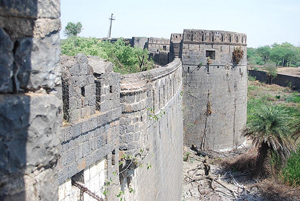 Ahmadnagar
Fort Ahmadnagar
Fort
Ahmadnagar Fort, which was built in 1490 AD, is located 1 km
away east of Ahmadnagar city in Maharashtra. This 500-year
old fort is circular in shape and has 18m high wall reinforced
with 22 bastions. To keep enemy at bay, a deep trench was dug
that surrounded the fort.
First
Prime
Minister
of free
India,
Pandit
Nehru
wrote
'Discovery
of India'
when
he was
imprisoned
in this
fort
here
in 1944.
Leaders
rooms
are still
alive
inside
the fort,
where
leaders
of freedom
struggle
were
imprisoned
from
1942-45.
Although,
the Indian
army
occupies
the fort,
entry
into
the fort
is allowed
by signing
at the
gate.
But photography
is not
allowed
inside
the fort.
Ahmadnagar
is in
the central
Maharashtra,
which
is close
to most
of the
major
cities
in Maharashtra.
Pune
is 120
km away
from
here,
while
Mumbai
is at
a distance
of 300
km. Its
good
location
makes
Ahmadnagar
easy
to reach
both
by road
and by
train.
Good
hotels
are available
in Ahmadnagar.
|
|
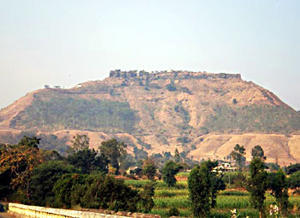 Ajinkyatara
Fort Ajinkyatara
Fort
Ajinkyatra Fort is in Satara, Maharashtra. The fort is located
at Ajinkyatara Mountain, which is 3,300 feet high. As the fort
is in the higher altitude, visitors can enjoy a magnificent
view of the entire Satara city. There are number of water tanks
inside the fort for storing water. So, there is no scarcity
of water even as the fort is in the higher place.
Viewing
the Ajinkyatara
Fort
from
far Yawateshwar
hill
too is
so nice.
Main
attractions
of this
place
are hiking,
trekking
and mountaineering.
For the
best
view,
one must
start
breasting
up the
hill
from
the base
of Ajinkyatara
at around
3.30
pm.
In
1708,
Shahu
Maharaj
won Ajinkyatara,
remained
with
the Marathas
till
1818.
The Ajinkyatara
fort
is a
major
historic
place
of Maharashtra,
and was
very
vital
as one
could
keep
watch
of the
entire
South
Maharashtra.
Visitors
can also
visit
the temples
of Devi
Mangalai,
Lord
Shankar
and Lord
Hanuman
on the
northeast
side
of the
fort.
Nandgiri
and Chandan-Vandan
forts
on the
east
and Jarandeshwar
and Yawateshwar
hills
on the
west
can also
be seen
from
the fort.
Satara
is well
connected
by rail
and road
with
Pune,
Sangli,
Miraj
and Kolhapur.
One can
stay
at the
hotels
in Satara.
|
|
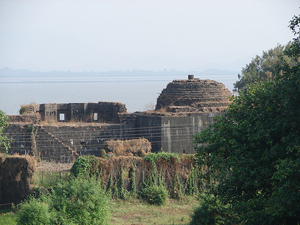 Arnala
Fort Arnala
Fort
Anara Fort is located at Arnala Islands, which is at a distance
of 8 miles north of Vasai in Maharashtra. As it is surrounded
on all sides by water, Arnala Fort is also known as 'Jaldurg'
or 'Janjire Arnala'. Anara Fort is mainly on the north side
of Anara Island. The main entrance is on the northern side,
while the fort has broad and strong high walls with three gates.
Steps
are made
that
lead
to ramparts
(walls),
so one
can take
a walk
around
the entire
boundary
wall.
To allow
entry
in the
small
rooms
and storehouses
below,
the ramparts
have
number
of small
openings
in its
broad
walls.
Villagers
use some
of these
storehouses
to store
their
paddy
crop.
One would
come
across
a canon
ball
still
stuck
on the
inner
side
of the
west
side
of the
wall
near
the temple.
It
is believed
that
Shivaji
built
this
fort
under
the leadership
of Kanoji
Agare.
Arnala
Fort
came
under
the British
control
in 1803
after
Bajirao
II Peshwa
signed
the infamous
Treaty
of Vasai.
The fort
also
has a
'Shankar
Temple'
and a
Mosque
where
religious
festivals
are celebrated
every
year.
The villagers
grow
vegetables
on plots
inside
the fort,
as well
as on
the western
side
out side
the fort.
|
|
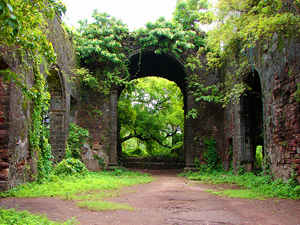 Bassein
Fort Bassein
Fort
Bassein Fort is located at Vasai, about 55 km from Mumbai,
Maharashtra. Bahadur Shah, Sultan of Gujarat, built the fort.
The main gate of this large fort leads to a small courtyard;
from here one can climb the ramparts to take a look at the
old structures, which are now in ruined conditions.
Despite
the fort
is so
old and
in the
condition
of ageing,
there
are many
remains,
which
are still
livens
the wonderful
architecture
of the
olden
days.
Three
chapels
inside
the fort
are in
the condition,
which
can be
easily
recognized.
They
have
facades
typical
of 17th
century
Portuguese
churches.
The southernmost
of these
has a
well-preserved
barrel
vaulted
ceiling.
Many
of the
watchtowers
still
stand
so strong,
with
secure
staircases.
Bassein
was ruled
over
by many
rulers
such
as the
Portuguese,
the Marathas
and finally
the British
and in
the course
of time
Bassein
became
a flourishing
shipbuilding
centre
and the
famous
Bassein
stone
was very
much
in demand.
|
|
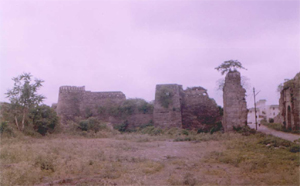 Chakan
Fort Chakan
Fort
Chakan Fort is located at Chakan near Pune in Maharashtra.
The last Maratha-British war was fought in this fort. This
fort was built keeping in mind that it might become a rare
kind of fort in Maharashtra. The fort is in the ageing condition,
which needs lots of maintenance.
One
can also
visit
Lord
Vishnu
Temple
in Varah
Avatar
near
the fort.
'Varah'
means
pig and
is the
third
avatar
(incarnation)
of Lord
Vishnu,
which
is seen
very
rarely
in India.
These
remains
of the
carvings
are found
in an
ancient
temple
of Shri
Chakreshwar,
which
is inside
the Chakan
fort.
These
carvings
are really
worth
seeing.
Pune
is well
connected
by air,
rail
and road
to the
important
places
within
the state
and also
within
the country.
Hotels
are available
in Pune.
|
|
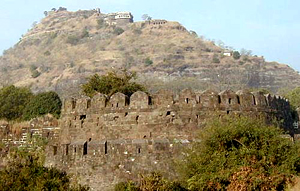 Daulatabad
Fort Daulatabad
Fort
Daulatabad is located at a distance of 13 km from Aurangabad.
This fort, which was once known as Devagiri, is a magnificent
12th century fortress standing atop a hill. Daulatabad, which
is constructed with excellent architecture, is one of the few
invincible forts in Maharashtra.
Mohammed
Bin Tughluq,
the sultan
of Delhi
gave
the name
Daulatabad
'The
city
of fortune'.
Series
of trick
defense
and secret
escapes
routes
are the
famous
features
of this
fort.
Jami
Masjid,
Bharatmata
Mandir,
the Chand
Minar,
Elephant
Tank
and 'Chini
Mahal'
or Chinese
Palace
are the
important
monuments
inside
the fort.
Daulatabad
Fort,
which
initially
had stronghold
of Yadav,
passed
through
the hands
of several
dynasties
in Deccan.
Daulatabad
is included
on the
MTDC
tour
of Ellora
from
Aurangabad.
The hourly
shuttle
buses
between
Aurangabad
can also
reach
the place
and the
Ellora
caves.
Hotels
are available
in Aurangabad.
|
|
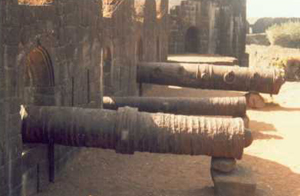 Gavilgad
Fort Gavilgad
Fort
Gavilgad Fort is near Chikhaldara hill station in Amravati
district, Maharashtra. It is believed that the fort is 300
years old. Some beautifully carved idols, which is believed
to carve during the period of the Nizams, when Elichpur was
their capital are worth to see.
Elephants,
bulls,
tigers,
lions
and Hindi,
Urdu
and Arabic
scripts
comprise
the carvings
on the
walls
of the
fort.
Idols
of Lord
Hanuman
and Lord
Shankar
are also
seen
in the
fort.
10 cannons
made
of iron;
copper
and brass
are also
there
inside
the fort.
Gavlis,
who were
rulers
of the
shepherd
community
in the
12th
/13th
century
built
the fort.
Then
came
on the
hands
of Gond
community
till
the time
they
were
defeated
by the
Mughals.
The fort
is at
present
under
the Melghat
Tiger
Project.
Nagpur
is the
nearest
airport,
230 km
away,
while
Amravati
is the
nearest
railway
station,
100 km
away.
Chikhaldara
is well
connected
by road.
|
|
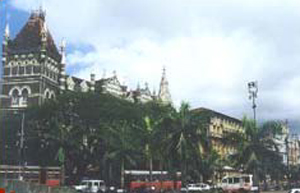 Mumbai
Fort Mumbai
Fort
An old British fort was located at north of Colaba, so the
area north of Colaba is known as Mumbai Fort. There are a lot
of imposing buildings from Mumbai's golden period here.
Among
many,
the St.
Johns
Church
is a
striking
building
in the
fort
area,
which
is worth
to visit.
The church
has been
dedicated
to the
warriors
who laid
down
their
lives
in the
Sindh
campaign
of 1838
and the
first
Afghan
war of
1843.
This
area
has now
been
established
as a
commercial
centre
of Mumbai.
So the
area
is jam-packed
with
commuters,
street
stalls
and the
grand
facades
of 19th
century
British
institutions
and trading
houses.
Mumbai
is well
connected
by air,
rail
and road
with
all the
important
places
within
and beyond
the state.
City
buses,
local
trains,
and taxis
are available
for local
transportation.
Hotels
are available
in Mumbai.
|
|
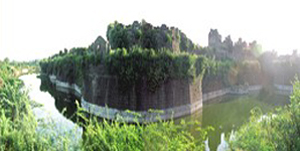 Kandhar
Fort Kandhar
Fort
Kandhar Fort is at Kandhar town in Nanded district of Maharashtra.
The fort is encircled with a ditch full of water. It is believed
that Rashtrakuta King Krishna III of Malkhed who styled himself
as Kandharpuradhi Swar constructed the fort. The ruins of this
majestic and historic fort are located at a distance of 50
km from the Ranthambhore National Park.
Old
Idgah
is at
some
distance
from
the fort.
Ranthambhore
National
Park
is also
so near
from
the fort.
One can
catch
buses
from
Nanded
to Kandhar,
accommodation
is available
at the
hotels
in Nanded.
|
|
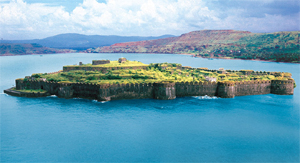 Murud
Janjira Murud
Janjira
Murud-Janjira is located 60 km away from Alibaug, Maharashtra.
This small village is on the top of a hillock. It is believed
that the rulers of Ahmednagar constructed the fort in the 15th
century. Despite the ravages of wind and tide, the fort is
almost entirely intact. This 300-year old fort is famous for
its fine architecture.
Since
its construction
by the
Ahmadnagar
rulers
under
the supervision
of their
regent
Malik
Ambar
in the
15th
century,
any enemy
never
conquered
the fort
for over
300 years.
Murud-Janjira
is probably
the only
of its
kind
on the
720 km
Maharashtra
coastline.
Murud
is popular
for its
appealing
beach,
murmuring
casuarinas,
coconut
and betel
palms
and an
ancient
fort.
The shrine
of Lord
Dattatreya
is near
the fort
on a
hillock.
The palace
of the
Nawab
and the
Janjira
caves
are also
worth
visiting.
The beaches
of Kashid
and Nandgaon
are in
a few
kilometers
away
from
the fort.
Nearest
airport
is at
Mumbai
(165
km),
while
nearest
railway
station
is at
Roha.
Regular
ferry
services
are available
from
Ferry
Wharf
up to
Rewas
(23 km).
One needs
to take
a bus
via Alibag
and Chaul
after
Rewas.
There
are also
regular
catamarans
from
the Gateway
of India
in Mumbai
going
up to
Mandwa.
|
|
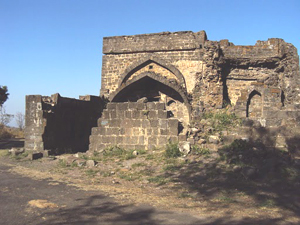 Narnala
Fort Narnala
Fort
Narnala Fort is located in Akola district in Maharashtra. The
fort is still in a good condition. The fort is located amidst
forest. The fort is well maintained and is worth giving a shot.
Neglect
of the
Archaeological
Survey
Department
is visible
in this
fort.
The fort
has a
fortress
wall
and beautiful
bastions.
Akola
is well
connected
by road
with
the important
and big
cities
of Maharashtra.
Hotels
are available
in Akola.
|
|
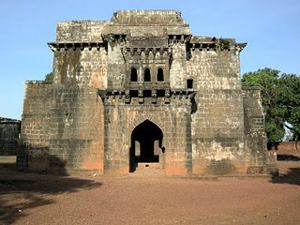 Panhala
Fort Panhala
Fort
Raja Bhoja founded Panhala fort in the late 12th century. This
fort is located 18 km northwest of Kolhapur. It has connection
with God Parashurama as well. Panhala fort, which carries a
rich heritage, is the largest of all the Deccan forts. This
is the only fort where the great ruler, Chhatrapati Shivaji
Maharaj is believed to have spent more than 500 days. It was
built between the 1178-1209 AD.
The
fort
covers
a vast
area
having
huge
boundary
walls
of over
7 km
in length
and a
steep
slope
beneath.
Three
magnificent
double-walled
gates
protect
the entrance
of the
fort.
There
is a
large
amberkhana
(granary)
inside
the fort,
which
has the
capacity
of containing
25,000
khandis
of grains.
Shilahara
dynasty,
Yadava
and Bahamani
kingdoms,
Shivaji,
Devagiri
Yadavas,
Adil
Shahi
dynasty
of Bijapur
army,
Mughal
Aurangzeb
(1700)
became
the controllers
of the
fort
from
time
to time.
It became
Maratha
state
capital
under
Tarabai
upto
1782,
and then
British
conquered
it in
1827.
Sajja
Kothi
- where
Sambhaji
was imprisoned,
Ambabaji
Temple
- where
Shivaji
used
to seek
blessings
before
venturing
on expeditions,
Pavankhind
- where
Baji
Prabhu
laid
down
his life
to cover
Shivaji's
escape,
Someshwar
Temple
are also
worth
to visit.
This
place
is an
ideal
for trekking
as well.
The nearest
railway
station
is at
Kolhapur,
18 km
away.
It is
only
428 km
from
Mumbai.
|
|
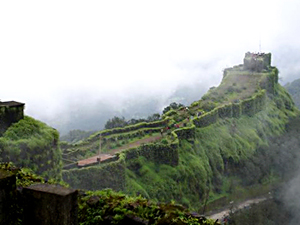 Pratapgad
Fort Pratapgad
Fort
Pratapgad Fort is a mountain fort built by Chatrapati Shivaji
Maharaj. The fort is at a distance of 24 km from the hill station
of Mahabaleshwar. The fort holds a sturdy view of coastal Konkan.
The Bhavani Temple and Afzal Khan's tomb are other places of
interest.
Pratapgad
consists
of two
forts
- an
upper
fort
built
on the
top of
the hill
and a
lower
fort
immediately
below
on the
south
and the
east.
Surrounding
areas
can be
easily
taken
guard
from
the fort
on almost
all the
sides.
The southern
side
is rocky
while
the eastern
side
has a
strong
outwork
ending
in the
Afzal
Buruj.
The
famous
minister
More
Tirmal
Pingale
on the
command
of Shivaji
Maharaj
to control
the rebellious
satraps
of the
surrounding
Javali
Basin
built
Pratapgad
Fort
in 1656.
It is
believed
that
Chatrapati
Shivaji
Maharaja
was blessed
with
a shining
sword
at the
temple
of Goddess
Bhavani
here.
The
historic
battle
between
Chatrapati
Shivaji
and Afzal
Khan,
the commander
of the
Bijapur
Sultanate
fought
here.
Bhavani
Temple
and Afzal
Khan's
Tomb
are major
attractions
where
are situated
near
the fort.
|
|
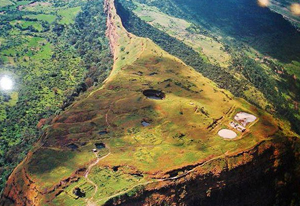 Purandhar
Fort Purandhar
Fort
Purandhar Fort is located at a distance of 40 km from Pune.
It played an important role in the history of the brave ruler
of the Maratha kingdom, Chhatrapati Shivaji. Purandhar was
the capital of the Maratha Kingdom, when it was in the budding
stages for quite sometime.
With
the insistence
of Jay
Singh,
Shivaji
concluded
a peace
treaty
at Purandhar
fort
in which
he was
agreed
to pay
visit
to Aurangzeb
at the
Imperial
court
of Agra.
Situated
atop
a mountain
at a
height
of 1,350
metres,
Purandhar
fort
is also
regarded
as an
ideal
picnic
spot.
National
Cadet
Corps
restores
the past
glory
of the
fort.
Pune
is well
connected
by air,
rail
and road
with
the important
places
of India
and abroad.
Hotels
are available
in Pune.
|
|
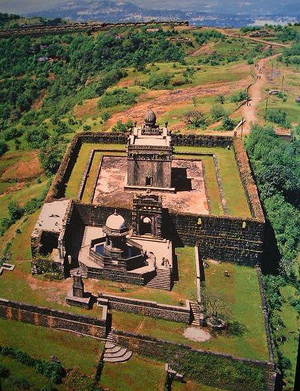 Raigad
Fort Raigad
Fort
Raigad was the capital of the Marathas under Chhatrapati Shivaji
Maharaj. Britishers named it 'Gibralter of the East' as the
well-fortified structure atop a hill that had repeatedly defied
attackers. Shivaji built the fort in the 14th century. Chit
Darwaja, also known as Jit Darwaja is at the foothills near
village Pachad.
Khoob
Ladha
Buruj
is a
strategically
located
tower,
from
where
any attacker
from
both
the side
could
be defended.
Maha
Darwaja
is at
a distance
of nearly
a mile
ahead
after
a difficult
climb.
This
350 years-old
main
entrance
to the
fort
stands
so majestically.
Mena
Darwaja
is a
special
entrance
for the
royal
ladies
and the
queens.
Rani
Vasa
or Queens'
Chambers
is to
the left
of Mena
Darwaja.
The royal
ladies
were
using
these
six rooms.
In front
of the
Rani
Vasa
is the
Palkhi
Darwaja,
special
entrance
for the
convoy
of Shivaji
Maharaj.
There
is a
row of
three
dark
chambers
to the
right
of Palkhi
Darwaja.
There
is the
palace
of Shivaji
Maharaj
to the
right
of the
granaries.
Mahabaleshwar,
Harihareshwar,
Ganpatipule,
Shivthar
Ghal,
Gandhar
Pale,
Torana:
Nijampur
- Fort
Mangad
- Raigad
Trek,
Birwadi
- Raigad
Trek
are the
other
attractions.
|
|
|
|
|
|
 |
 |
 |
|
|
 |
|
|
 |
|
Main
Menu |
Indian
Tours - State wise |
Indian
Tours - Zone wise |
International
Tours |
|
 |
| |
|
|
|
|
|
|
| |
© OM
Tourism. All rights reserved. |
|
|
|
 |